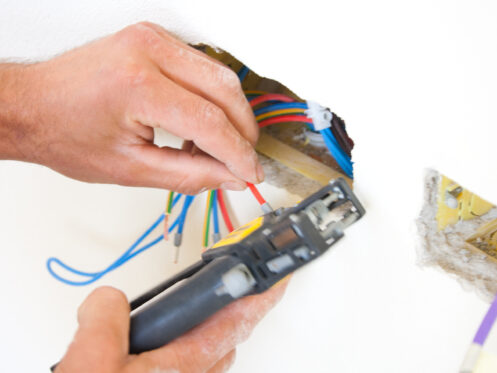It’s difficult to imagine life without all the comforts that electricity provides. While it’s never been more beneficial to have working electricity in your Dixon, CA, home, it’s vital to remember that electricity also comes with various risks. To ensure that you and your family stay as safe as possible while using electricity in your home, follow these tips.
1. Don’t Overload Outlets
Electrical outlets usually have only two receptacles. To avoid overloading an outlet, you should only have two devices plugged into it. Extension cords and power strips allow you to plug in more devices, but they can create a dangerous situation if used improperly. Multiple high-voltage devices should always be plugged into separate outlets to avoid overload. An overloaded outlet can trip a breaker, blow a fuse, damage your outlet and devices, or even cause a fire.
2. Don’t Use Damaged or Faulty Electronic Devices
Only use electrical devices if you know they’re in good condition. If you see any frayed wires, singe marks, cracked batteries, sparks, smell smoke, or hear odd noises, unplug the device immediately. Replacing damaged electronic devices may be expensive, but no amount of money is worth the risk of electrocution or house fires.
3. Don’t Use Damaged or Faulty Outlets
Outlets can fail for a variety of reasons, including age, wear, and damage from pests or other factors. Symptoms of a damaged or faulty outlet include:
- Singe marks around the outlet
- Crackling or buzzing noises
- Sparks
- Visible smoke
- The scent of smoke
- Hot to the touch
- Lights flickering when the outlet is in use
- Unusual behavior from devices when plugged in
If you notice any of these signs, stop using the outlet immediately. Turn off the power to the outlet if possible, and call a professional electrician to repair and inspect or replace the outlet.
4. Never Perform DIY Electrical Work
No matter how skilled you are at DIY home repairs, you should never attempt electrical work by yourself unless you’re a licensed electrician. Even simple tasks can pose a high risk of electrocution and fire. Improperly performed electrical work can also lead to damage to your home’s wiring, resulting in costly repairs. A professional electrician knows how to safely approach every electrical repair and installation in your home without causing additional damage.
5. Keep Children and Pets Away From Electrical Hazards
Children and pets may not understand the dangers of electrical cords and outlets. Children might stick objects into outlets, risking sparks or electrocution, while pets may chew on power cords, leading to potential electrocution or fire.
To protect your family, childproof all outlets with plastic housing or covers, and store electrical cords out of reach. Wire management boxes and cord concealers are great options for safely hiding cords while they’re in use.
Ideally, keep children and pets away from power cords, outlets, and dangerous electrical appliances. Supervise them closely to prevent accidents. As children grow older, teach them about electrical safety, and train pets to avoid cords and outlets.
6. Keep All Electrical Devices and Power Cords Away From Water
Bathrooms and kitchens have outlets to power devices such as hair dryers, curling irons, mixers, coffee makers, and more. The risk of electrical mishaps is higher in these areas due to the presence of water.
It’s important to have ground fault circuit interrupters (GFCIs) installed in kitchens, bathrooms, and other areas where water is present. GFCIs immediately cut the power to outlets when they detect ground faults, such as when the outlet or an electronic device is exposed to water.
Water can also pose a risk outside of kitchens and bathrooms. Leaking pipes, roofs, or basements can cause hazardous water damage. Moisture buildup in floors and walls may deteriorate the protective covering of wiring, creating a hidden safety risk. If you have significant water damage in your home, call a professional electrician to inspect and repair any electrical wiring damage.
7. Exercise Caution During Storms
Storms can cause power surges, which can damage electronics and increase the risk of electrocution and fire.
Unplug as many electronics as possible during storms. If you use power strips, make sure they have built-in surge protection. For even greater protection, consider installing a whole-house surge protector to safeguard your home’s electrical system during any type of weather. We also offer whole-home generator solutions!
8. Don’t Pull on the Cord to Remove the Plug
Pulling on a cord to remove a plug from an outlet can damage the cord and the wires inside. This can cause short circuits and expose wires, increasing the risk of electric shock or fire. Always unplug devices by grasping the plug itself to avoid damaging the cord and plug.
9. Unplug Electrical Devices When Not in Use
Leaving electrical devices plugged in when not in use is not only a waste of energy but also a safety risk. Unattended electronics can overheat, short circuit, or even catch fire, especially high-voltage devices like space heaters, hair dryers, irons, and window-mounted air conditioners.
It’s particularly important to unplug devices when you’ll be away from home for an extended period. The longer devices remain plugged in without being monitored, the higher the risk of fire.
10. Perform Regular Electrical Inspections
To ensure your home’s electrical system is as safe as possible, have it inspected by a professional electrician regularly. Inspections can uncover issues that you may not notice until they become serious problems!
If your home needs electrical repairs, you can count on our skilled professionals at Greiner Heating, Air, and Electric to provide high-quality and efficient service. In addition to electrical repair, we also offer installation and repair services for solar panels, generators, EV chargers, air conditioners, furnaces, and more. For additional information on any of the services we provide to the areas in and around Dixon, contact us at Greiner Heating, Air, and Electric today.
